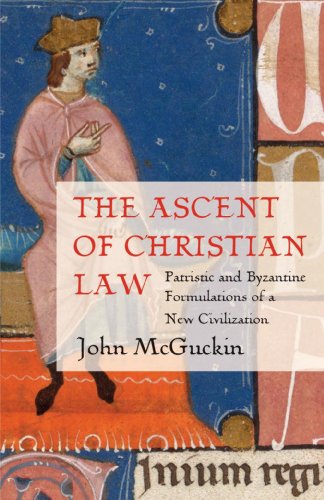The Ascent of Christian Law: Patristic and Byzantine Formulations of a New Civilization
John Anthony McGuckin
St Vladimir's Seminary Press,U.S
ISBN: 978-0881414035
Price: £13.66 (Amazon)
Regardless of the recent influx of books on the development of Orthodox Tradition becoming available in English, the topic of the Canon Tradition remains an area which is sparcely covered in great detail. Most introductions to Orthodox Christianity will cover the Oecumenical Councils and definition of Canon but will not go much further in covering the vast history of the topic.
John Anthony McGuckin
St Vladimir's Seminary Press,U.S
ISBN: 978-0881414035
Price: £13.66 (Amazon)
Regardless of the recent influx of books on the development of Orthodox Tradition becoming available in English, the topic of the Canon Tradition remains an area which is sparcely covered in great detail. Most introductions to Orthodox Christianity will cover the Oecumenical Councils and definition of Canon but will not go much further in covering the vast history of the topic.
McGuckin has stepped in to fill this void and has done so in a manner suiting the complexity of the subject matter. The Ascent of Christian Law is a must for any student of Canonology or reader of the subject. The book is very readable, regardless of the depth of your understanding, and covers both East and West in great detail, starting with the scriptural foundations of the Canons. It then proceeds to pass through various phases in the development of the Canons before reaching its conclusion at the later Byzantine Canonists and their input to the Canon Tradition of the later Byzantine Empire.
The level of historical research put into the text also makes this book worth reading, as it puts the councils and Synods of the first millenium into the context of the tradition as a whole. This allows the reader to see why the council was needed and how it impacted the development of the Orthodox Tradition, rather than simply giving us details on the event itself.
One flaw I can see with this book is McGuckin's need to state his opinion in his footnotes, which can take away from the academic nature of the text itself. Some readers may be able to understand the innocent manner in which this is played out, but for others it can be offputting to see a footnote in academic text referring to those who hold a certain viewpoint as 'dummies.' Regardless of this slight hitch, the contents of the book in itself are beautifully covered in a way rarely seen in a book on this subject.
Overall, McGuckin has filled in a black hole which has plagued the world of Modern Orthodox Academics for decades. He has covered the vast and complex topic of the Canons in a way which makes it easy to understand and relevant to the reader. This in itself is an accomplishment which few have achieved and makes the book a highly recommended piece of reading for anybody interested in the topic.


No comments:
Post a Comment